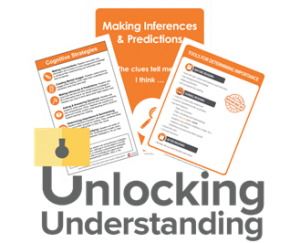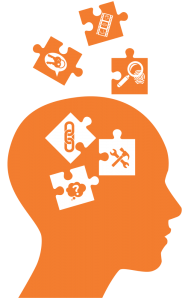 In each Unlocking Understanding session, registered participants receive an Interactive Notebook as well as all of the supporting instructional materials necessary for successful implementation of what’s covered in the session. This includes, the Cognitive Strategy Routine card, instructional posters, Cognitive Strategy posters, scaffold posters, graphic organizers, blackline masters, sample lesson plans, planning tools, and more!
In each Unlocking Understanding session, registered participants receive an Interactive Notebook as well as all of the supporting instructional materials necessary for successful implementation of what’s covered in the session. This includes, the Cognitive Strategy Routine card, instructional posters, Cognitive Strategy posters, scaffold posters, graphic organizers, blackline masters, sample lesson plans, planning tools, and more!
 The Cognitive Strategy Routine: During this interactive and engaging overview session, participants will explore a routine that is designed to be used at every grade level, in both English-language and Spanish-language classrooms to enhance comprehension instruction. This consistent, explicit eight-step routine will change the way educators view their own reading and how they teach students to comprehend across the content areas! (1.5 hours, Grades K-12)
The Cognitive Strategy Routine: During this interactive and engaging overview session, participants will explore a routine that is designed to be used at every grade level, in both English-language and Spanish-language classrooms to enhance comprehension instruction. This consistent, explicit eight-step routine will change the way educators view their own reading and how they teach students to comprehend across the content areas! (1.5 hours, Grades K-12)
Instructional Routines for Enhancing Comprehension: In this powerful session, participants will learn how to effectively implement 2 highly supportive instructional routines for enhancing comprehension. A Comprehension Purpose Question (CPQ) provides a scaffold for students as it links to strategies that good readers use. It also aids in increasing student motivation to read. In this training module, participants explore CPQs, practice a process for planning a CPQ, and evaluate and select quality CPQs. The Think-Turn-Talk routine provides students with opportunities to think and participate in deep discussions about text. Well planned questions during reading support deeper comprehension and engagement with text. Participants will leave the session with lessons they will be able to teach in their class the next day. (3 hours, Grades K-12)
 Making Connections: During Making Connections, participants will explore ways to effectively build background knowledge and how to help students activate existing background knowledge necessary for comprehension. This foundational session addresses how to teach the strategy of Making Connections across content areas using the eight-step Cognitive Strategy Routine. Participants will experience lessons, and will work together to plan lessons they can implement in their classrooms immediately. (This full day session can be delivered in 2 half-day sessions. Grades K-2, 3-5, 6-12)
Making Connections: During Making Connections, participants will explore ways to effectively build background knowledge and how to help students activate existing background knowledge necessary for comprehension. This foundational session addresses how to teach the strategy of Making Connections across content areas using the eight-step Cognitive Strategy Routine. Participants will experience lessons, and will work together to plan lessons they can implement in their classrooms immediately. (This full day session can be delivered in 2 half-day sessions. Grades K-2, 3-5, 6-12)
 Creating Mental Images: Creating mental images may seem like a natural part of reading, but many students require explicit instruction to use this strategy successfully. In this session, participants will examine ways to teach this strategy effectively. Participants will experience lessons, and will work together to plan lessons they can implement in their classrooms immediately.
Creating Mental Images: Creating mental images may seem like a natural part of reading, but many students require explicit instruction to use this strategy successfully. In this session, participants will examine ways to teach this strategy effectively. Participants will experience lessons, and will work together to plan lessons they can implement in their classrooms immediately.
(This full day session can be delivered in 2 half-day sessions. Grades K-2, 3-5)
Making Inferences, Part 1: Do your students struggle to make inferences while reading? Making inferences is a complex strategy necessary for effective reading comprehension. This session provides a routine for explicitly teaching students to make inferences and effective predictions. Participants will use a powerful scaffold that supports students as they learn the difference between implicit and explicit text information. Participants will view lessons, and will work together to plan lessons they can implement in their classrooms immediately. (This full day session can be delivered in 2 half-day sessions. Grades K-2, 3-5, 6-12)
 Making Inferences, Part 2: Do your students struggle to make inferences while reading? Making inferences is a complex strategy necessary for effective reading comprehension. This session provides a routine for explicitly teaching students to make inferences. Participants will use a powerful scaffold that supports students as they learn the difference between implicit and explicit text information. Participants will view lessons, and will work together to plan lessons they can implement in their classrooms immediately. (It is recommended that participants attend Making Inferences & Predictions, Part 1 before attending Part 2 of this training. This full day session can be delivered in 2 half-day sessions. Grades 6-12 only.)
Making Inferences, Part 2: Do your students struggle to make inferences while reading? Making inferences is a complex strategy necessary for effective reading comprehension. This session provides a routine for explicitly teaching students to make inferences. Participants will use a powerful scaffold that supports students as they learn the difference between implicit and explicit text information. Participants will view lessons, and will work together to plan lessons they can implement in their classrooms immediately. (It is recommended that participants attend Making Inferences & Predictions, Part 1 before attending Part 2 of this training. This full day session can be delivered in 2 half-day sessions. Grades 6-12 only.)
Determining Importance & Summarizing Literary Text: Although good readers determine importance and summarize all kind of text, in this training we are going to specifically look at how we determine importance and summarize literary text. With literary text, we depend on story structure to help us determine what information is most important. This session focuses on laying a strong foundation in the primary grades by using scaffolds that support students in reading literary text in kindergarten and beyond. During the session, participants will experience a lesson, and will work together to plan lessons they can implement in their classrooms immediately. (This full day session can be delivered in 2 half-day sessions. Grades K-2, 3-5)
Determining Importance & Summarizing Informational Text: Do your students struggle deciding what’s most important versus what is interesting when they read informational texts? Determining importance and summarizing is a challenging task for many young readers. This session focuses on laying a strong foundation in the primary grades by using scaffolds that support students in reading informational text in kindergarten and beyond. During the session, participants will experience a lesson, and will work together to plan lessons they can implement in their classrooms immediately. (This full day session can be delivered in 2 half-day sessions. This session is best suited for Grades K-2.)

Determining Importance & Summarizing Informational Text, Part 1: Do your students struggle to determine the most important information or main idea of text? Do they tend to produce summaries that miss the mark? Determining importance and summarizing is a complicated task. This session focuses on laying a strong foundation by using scaffolds to help students identify the topic and main ideas in content area texts. Participants will learn to support students in creating clear summaries of descriptive texts. These summaries will help students better understand and engage with texts, and will help them to answer test questions correctly. During the session, participants will experience a lesson, and will work together to plan lessons they can implement in their classrooms immediately. (This full day session can be delivered in 2 half-day sessions. This session is designed for Grades 3-5, 6-12.)
Determining Importance & Summarizing Informational Text, Part 2: Do your students struggle to determine the most important information or main idea of sequential, compare and contrast, cause and effect, or problem and solution texts? Do they struggle to write clear summaries of these types of texts? Participants will learn to support students in creating clear summaries of various text structures. These summaries will help students better understand and engage with texts, and will help them to answer test questions correctly. During the session, participants will experience a lesson, and will work together to plan lessons they can implement in their classrooms immediately. (It is recommended that participants attend Determining Importance & Summarizing, Part 1 before attending Part 2 of this training. This full day session can be delivered in 2 half-day sessions. This session is designed for Grades 3-5, 6-12.)
 Asking & Answering Questions: Helping students to be aware of the questions they think about while reading helps to increase comprehension. Teaching students how to successfully answer questions about text can often be more challenging. In this session, we address the research behind asking and answering questions, and we discuss ways to help students understand how questions help them as they are reading. During the session, participants will experience a lesson, and will work together to plan lessons they can implement in their classrooms immediately. (3 hours, Grades 1-3)
Asking & Answering Questions: Helping students to be aware of the questions they think about while reading helps to increase comprehension. Teaching students how to successfully answer questions about text can often be more challenging. In this session, we address the research behind asking and answering questions, and we discuss ways to help students understand how questions help them as they are reading. During the session, participants will experience a lesson, and will work together to plan lessons they can implement in their classrooms immediately. (3 hours, Grades 1-3)
Listening Comprehension: Listening comprehension is one of the best predictors of reading comprehension. It is essential that students have opportunities to participate in good comprehension instruction prior to focusing on decoding. During the Listening Comprehension session, teachers will experience and learn how to plan an engaging, interactive read-alouds to develop foundation skills in comprehension. (3 hours, Grades PK-2)
To learn more or schedule on-site training, please contact the CLI Solutions Group or reach out to one of our Unlocking Understanding development team members by calling 713-500-8248 or email us at unlockingunderstanding@uth.tmc.edu.

![]() Summer Prekindergarten Workshop: Phonological Awareness & Creating an Effective Classroom Environment: June 19, 2019, Houston.
Summer Prekindergarten Workshop: Phonological Awareness & Creating an Effective Classroom Environment: June 19, 2019, Houston.![]() Talk With Me: Promoting Early Language Development: June 25, 2019, Houston.
Talk With Me: Promoting Early Language Development: June 25, 2019, Houston.![]() Read With Me: Promoting Early Literacy Development: June 26, 2019, Houston.
Read With Me: Promoting Early Literacy Development: June 26, 2019, Houston.![]() Connect With Me: Promoting Social and Emotional Development: June 27, 2019, Houston.
Connect With Me: Promoting Social and Emotional Development: June 27, 2019, Houston.



 In each
In each  The Cognitive Strategy Routine: During this interactive and engaging overview session, participants will explore a routine that is designed to be used at every grade level, in both English-language and Spanish-language classrooms to enhance comprehension instruction. This consistent, explicit eight-step routine will change the way educators view their own reading and how they teach students to comprehend across the content areas! (1.5 hours, Grades K-12)
The Cognitive Strategy Routine: During this interactive and engaging overview session, participants will explore a routine that is designed to be used at every grade level, in both English-language and Spanish-language classrooms to enhance comprehension instruction. This consistent, explicit eight-step routine will change the way educators view their own reading and how they teach students to comprehend across the content areas! (1.5 hours, Grades K-12) Making Connections: During Making Connections, participants will explore ways to effectively build background knowledge and how to help students activate existing background knowledge necessary for comprehension. This foundational session addresses how to teach the strategy of Making Connections across content areas using the eight-step Cognitive Strategy Routine. Participants will experience lessons, and will work together to plan lessons they can implement in their classrooms immediately. (This full day session can be delivered in 2 half-day sessions. Grades K-2, 3-5, 6-12)
Making Connections: During Making Connections, participants will explore ways to effectively build background knowledge and how to help students activate existing background knowledge necessary for comprehension. This foundational session addresses how to teach the strategy of Making Connections across content areas using the eight-step Cognitive Strategy Routine. Participants will experience lessons, and will work together to plan lessons they can implement in their classrooms immediately. (This full day session can be delivered in 2 half-day sessions. Grades K-2, 3-5, 6-12) Creating Mental Images: Creating mental images may seem like a natural part of reading, but many students require explicit instruction to use this strategy successfully. In this session, participants will examine ways to teach this strategy effectively. Participants will experience lessons, and will work together to plan lessons they can implement in their classrooms immediately.
Creating Mental Images: Creating mental images may seem like a natural part of reading, but many students require explicit instruction to use this strategy successfully. In this session, participants will examine ways to teach this strategy effectively. Participants will experience lessons, and will work together to plan lessons they can implement in their classrooms immediately. Making Inferences, Part 2: Do your students struggle to make inferences while reading? Making inferences is a complex strategy necessary for effective reading comprehension. This session provides a routine for explicitly teaching students to make inferences. Participants will use a powerful scaffold that supports students as they learn the difference between implicit and explicit text information. Participants will view lessons, and will work together to plan lessons they can implement in their classrooms immediately. (It is recommended that participants attend Making Inferences & Predictions, Part 1 before attending Part 2 of this training. This full day session can be delivered in 2 half-day sessions. Grades 6-12 only.)
Making Inferences, Part 2: Do your students struggle to make inferences while reading? Making inferences is a complex strategy necessary for effective reading comprehension. This session provides a routine for explicitly teaching students to make inferences. Participants will use a powerful scaffold that supports students as they learn the difference between implicit and explicit text information. Participants will view lessons, and will work together to plan lessons they can implement in their classrooms immediately. (It is recommended that participants attend Making Inferences & Predictions, Part 1 before attending Part 2 of this training. This full day session can be delivered in 2 half-day sessions. Grades 6-12 only.)
 Asking & Answering Questions: Helping students to be aware of the questions they think about while reading helps to increase comprehension. Teaching students how to successfully answer questions about text can often be more challenging. In this session, we address the research behind asking and answering questions, and we discuss ways to help students understand how questions help them as they are reading. During the session, participants will experience a lesson, and will work together to plan lessons they can implement in their classrooms immediately. (3 hours, Grades 1-3)
Asking & Answering Questions: Helping students to be aware of the questions they think about while reading helps to increase comprehension. Teaching students how to successfully answer questions about text can often be more challenging. In this session, we address the research behind asking and answering questions, and we discuss ways to help students understand how questions help them as they are reading. During the session, participants will experience a lesson, and will work together to plan lessons they can implement in their classrooms immediately. (3 hours, Grades 1-3)
